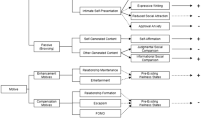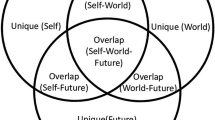Summary
The Self-Evaluation and Social Support Schedule (SESS), an interview-based instrument, is described, which aims to give a comprehensive description of a person's social milieu in terms of ‘objective’ and ‘subjective’ measures. On the basis of a population survey of 400 largely working-class women, a tentative causal model is developed which relates both the quality of current interpersonal ties and childhood experiences to current negative and positive measures of self-esteem. A major purpose of the execrise is to develop positive and negative indices of the social environment that can be used to elucidate the aetiological role of self-esteem in the development of depression. This is the task of a third paper.
Similar content being viewed by others
References
Alsaker FD (1989) School achievement, perceived academic competence and global self-esteem. School Psychol Int 10: 147–158
Andrews B, Brown GW (1988) Social support, onset of depression and personality: an exploratory analysis. Soc Psychiatry Psychiatr Edpidemiol 23: 99–108
Bifulco a, Brown GW, Harris TO, (1987) Childhood loss of parent and adult psychiatric disorder: the Islington Study. J Affective Disord 12: 115–128
Brown GW (1988) Causal paths, chains and strands. In: Rutter M (ed) Studies of psychosocial risk: the power of longitudinal data. Cambridge University Press, Cambridge, pp 285–314
Brown GW, Bifulco A (1990) Motherhood, employment and the development of depression: A replication of a finding? Br J Psychiatry 156: 169–179
Brown GW, Harris TO (1978) Social origins of depression. Tavistock, London
Brown GW, Harris TO (1986) Establishing causal links: the Bedford College studies of depression. In: Katschnig H (ed) Life events and psychiatric disorders: controversial issues. Cambridge University Press, Cambridge, pp 107–187
Brown GW, Harris TO (1989) Life events and illness. Guilford, New York; Unwin and Hyman, London
Brown GW, Rutter M (1966) The measurement of family activities and relationships: a methodological study, Hum Relat 19: 241–263
Brown GW, Andrews B, Harris TO, Adler Z, Bridge L (1986a) Social support, self-esteem and depression. Psychol Med 16: 813–831
Brown GW, Harris TO, Bifulco A (1986b) Long-term effect of early loss of parent. In: Rutter M, Izard C, Read P (eds) Depression in childhood developmental perspectives. Guilford, New York, pp 251–296
Brown GW, Andrews B, Bifulco A, Veiel H, (1990a) Self-esteem and depression. 1. Measurement issues and prediction of onset. Soc Psychiatry Psychiatr Epidemiol 25: 200–209
Brown GW, Bifulco A, Andrews B (1990b) Self-esteem and depression. 3. Aetiological Issues. Soc Psychiatry Psychiatr Epidemiol 25: 235–243
Cohen J (1960) A coefficient of agreement for nominal scales. Psychol Measurem 20: 37–46
Harris TO, Brown GW, Bifulco A (1986) Loss of parent in childhood and adult psychiatric disorder: the Walthamstow Study 1. The role of lack of adequate parental care. Psychol Med 16: 641–659
Hellevik O (1984) Introduction to causal analysis. G. Allen and Unwin. London
Henderson AS, Byrne DG, Duncan-Jones P (1981) Neurosis and the social environment, Academic Press, Sydney
Kaplan HB (1971) Social class and self derogation: a conditional relationship Sociometry 34: 41–64
Kaplan HB (1976) Antecedensts of negative self-attitudes: membership group devaluation and defencelessness. Soc Psychiatry 11: 15–25
O'Connor P, Brown GW (1984) Supportive relationships: fact or fancy? J Soc Pers Relat 1: 159–175
Quinton D, Rutter M, Rowland O (1976) An evaluation of an interview assessment of marriage. Psychol Med 6: 577–586
Rosenberg M (1965) Society and the adolescent self-image, Princeton University Press, Princeton
Rosenberg M (1982) Psychological selectivity in self-esteem formation. In: Rosenberg M, Kaplan HB (eds) Social psychology of the self-concept, Davidson, USA, pp 535–546
Rosenthal R, Rubin DB (1982) A simple, general purpose display of magnitude of experimental affect. J Educational Psychol 74: 166–169
Rutter M, Brown GW (1966) The measurement of family activities and relationships: a methodological study. Hum Relat 19: 241–263
Taylor SE, Brown JD (1968) Inusion and well-being: a solid psychological perspective on mental health. Psychol bull 103: 193–210
Author information
Authors and Affiliations
Rights and permissions
About this article
Cite this article
Brown, G.W., Bifulco, A., Veiel, H.O.F. et al. Self-esteem and depression. Soc Psychiatry Psychiatr Epidemiol 25, 225–234 (1990). https://doi.org/10.1007/BF00788643
Accepted:
Issue Date:
DOI: https://doi.org/10.1007/BF00788643




